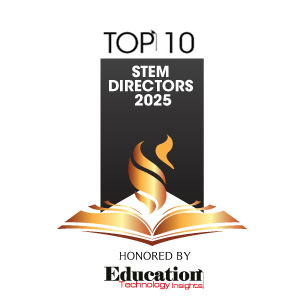THANK YOU FOR SUBSCRIBING
Be first to read the latest tech news, Industry Leader's Insights, and CIO interviews of medium and large enterprises exclusively from Education Technology Insights
Inspiring the Next Generation of Innovators
Elizabeth Taylor, Director, STEM Center at Milwaukee School of Engineering
Elizabeth Taylor is leading initiatives that have impacted over 20,000 K-12 students. With a background in mechanical engineering and nonprofit leadership, she champions inclusive STEM education and emphasizes early exposure to computing and engineering.  Elizabeth Taylor, Director, STEM Center at Milwaukee School of Engineering
Elizabeth Taylor, Director, STEM Center at Milwaukee School of Engineering
Previously, she worked as a senior engineer at Eaton. Taylor holds a Master’s in nonprofit management & leadership from the University of Wisconsin-Milwaukee and a bachelor’s in mechanical engineering from Kettering University.
A Milwaukee Business Journal 40 Under 40 honoree, she also served as board president of the Wisconsin Climbers Association. Passionate about equity in STEM, she empowers students to explore innovation and pursue careers in science and engineering.
Through this article, Taylor emphasizes the importance of expanding equitable access to STEM education for underrepresented groups through early exposure and volunteer-driven outreach to bridge the talent gap and inspire future innovators.
Engineering a Future for Women in STEM
Before joining the Milwaukee School of Engineering (MSOE), I worked as a mechanical engineer in the industry. While studying at Kettering University, I partnered with the local Girl Scout council to create a Girl Scout STEM Badge Day, allowing girls to earn STEM badges alongside Kettering students. A Girl Scout event was one of my first exposures to engineering and I wanted to replicate that opportunity for young women in Flint, Michigan, and beyond.
“Our goal is to equip students with the knowledge to make informed career decisions, whether they choose a university, technical college, or direct workforce entry”
I found this work incredibly fulfilling and hoped to pursue it full-time one day. Though I originally envisioned this career shift happening later, the opportunity at MSOE was one I couldn’t pass up.
Expanding Access for Future Innovators There remains a talent gap for women and underrepresented groups in STEM careers and collegiate programs. Closing this gap requires providing students—starting in elementary school—with opportunities to see what STEM looks like beyond the classroom.
A key challenge is the lack of access to engineering and technology courses. At the STEM Center, our mission is to provide outreach programs alongside an equitable access model, ensuring every student can envision a future in STEM.
Building Skills for Future Success
According to the National Center for Education Statistics, 35% of students who declare a STEM major in college eventually switch fields. To combat this, we offer "spark" programs that ignite interest in STEM and connect students—especially those in upper elementary and beyond—to specific majors and careers.
The foundational skills needed for success in STEM— persistence, curiosity, creativity and teamwork—are valuable in any field. We aim to equip students with the knowledge to make informed career decisions, whether they choose a university, technical college or direct workforce entry.
Community Support Fuels STEM Access
One of the STEM Center’s greatest strengths is the overwhelming support from our community and donors. Thanks to philanthropic contributions, we offer full-ride scholarships for all our programs.
For high-need schools, we provide free programming and reimburse transportation costs. Nearly 90% of schools visiting the STEM Center this year reported that our STEM on-site program is their only out-of-school STEM experience. This is made possible by the generous funding from our donors. Additionally, all our evening and weekend programs offer noquestions-asked scholarships—any student needing financial assistance receives it without an application.
Advancing STEM Education Through Collaboration
We continuously engage with K-12 schools and organizations to understand the most pressing STEM education needs in the Milwaukee region and beyond. We create meaningful collaborations that strengthen STEM education by aligning our expertise with community needs.
With my engineering background, I bring a mindset of continuous improvement to the STEM Center. Recently, we expanded our team by adding an educational researcher, further opening doors for partnerships with research institutions.
Inspire the Next Generation
Get involved with your local STEM programs—whether through universities, scouting initiatives or nonprofits. Suppose it wasn’t for a group of collegiate Society of Women Engineers (SWE) students who volunteered when I was a junior Girl Scout. In that case, I might never have realized engineering was an option for me.
Volunteers may not always see their direct impact, but their influence can be life-changing for students.
Read Also
Empowering Leadership through Innovation in Higher Education
The New Era of Education
Redefining Readiness: A Path Toward a Technology-Agnostic Future
Pioneering STEM Education for a Future of Innovators
The Indispensable Role of Emotional Intelligence in K-12 Technology Leadership
Tools over Solutions

I agree We use cookies on this website to enhance your user experience. By clicking any link on this page you are giving your consent for us to set cookies. More info





















